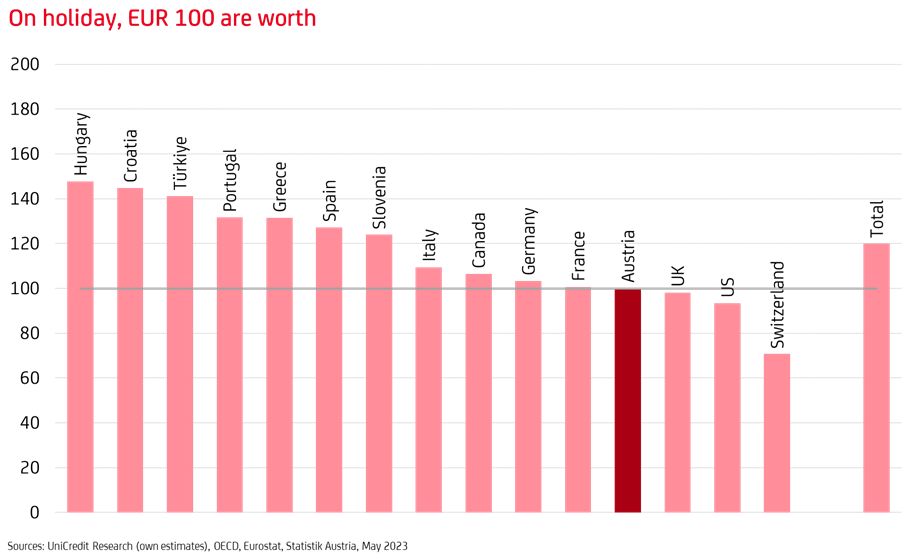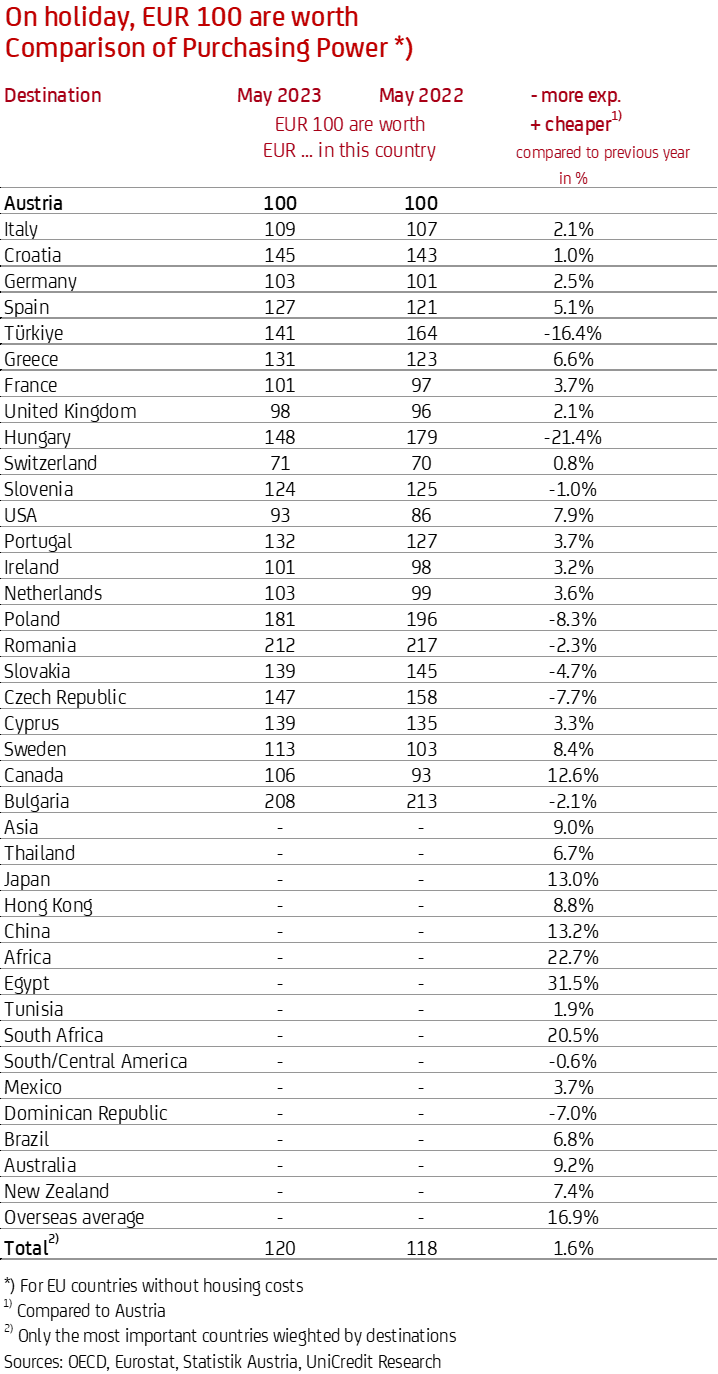Holiday Euro 2023 worth on average 20 percent more than at home
- Value increase of holiday euro abroad compared to 2022 driven partly by appreciation of the euro and by Austria's higher inflation
- With some exceptions, overseas destinations prove significantly cheaper than in 2022 thanks to appreciation of the euro, despite higher inflation in some cases
- Turkey and Hungary noticeably more expensive compared to 2022
- Nevertheless, Hungary, Turkey and Croatia still topping the list of favourite destinations
- Holiday euro in United Kingdom and USA worth more than in 2022 due to stronger euro
- Switzerland still among most expensive holiday destinations

The purchasing power of the euro, i.e. the holiday euro, is likely to remain just one of many decision-making bases for holidaymakers over summer 2023, with considerations surrounding the current geopolitical crises, combined with strong inflation and sharp rises in energy prices, also playing a more influential role. In 2023, the holiday euro is worth an average of 20% more abroad than it is in Austria. “In comparison to 2022, European destinations tend to have become slightly cheaper in 2023, while overseas destinations are proving significantly less expensive”, says Stefan Bruckbauer, UniCredit Bank Austria Chief Economist, regarding the current calculation of the holiday euro. He also adds: “In Turkey and Hungary, where the holiday euro has previously been the most valuable, you get less this year than last year due to the high inflation. However, these two countries, together with Croatia, remain among the most popular holiday destinations where the holiday euro is worth the most.”
Overall, there has been an increase in the holiday euro compared to the summer of 2022, because price increases in many of the key holiday destinations amongst Austrians were somewhat lower than in Austria. The appreciation of the euro, especially in relation to overseas destinations, is also making itself felt in an increase in the holiday euro abroad. “Due to the appreciation of the euro and the higher inflation in Austria in some cases, the holiday euro abroad has become more valuable relative to the domestic market”, says Stefan Bruckbauer, summarising the situation in the summer of 2023.
Holidays in Hungary, Turkey and Croatia continue to be much cheaper than at home
Of Austrians' key holiday destinations, you can still get the most for your holiday euro in Turkey, Hungary and Croatia. Among the most popular holiday destinations, tourists from Austria can also expect a greater value for their holiday euro in Portugal, Greece, Slovenia and Spain. “In the holiday destinations that are particularly popular for city breaks, Austrian tourists are still likely to face a higher price level than at home this year, for example in the United Kingdom, France and the US, although the difference has been significantly reduced compared to the previous year”, says Bruckbauer. In many countries in eastern and southeastern Europe, the holiday euro continues to be worth much more than in Austria, especially in Bulgaria, Romania and Poland, although its value has decreased compared to the previous year.
Overseas travel averaging around 17% cheaper in 2023 compared to 2022
Along with the different price developments overseas, exchange rate trends also play a role in comparing the value of the holiday euro. “Based on pre-pandemic holiday behaviour, there was a significant increase in the holiday euro in overseas destinations. This was due not only to the stronger euro but also to the price increases, which were lower in some cases”, says Bruckbauer.
Switzerland is the most expensive holiday destination
Despite a renewed appreciation of the Swiss franc since 2022, low inflation in Switzerland has led to the holiday euro increasing slightly in value compared to last year. Nevertheless, of the most popular holiday destinations, Switzerland remains the most expensive for your typical Austrian family. “Despite low inflation in recent years, the appreciation in Switzerland continues to ensure that the value of the holiday euro in the country is around 75% of that in Austria, which is in line with its long-term average”, says Bruckbauer, adding: “Not since value comparisons were first introduced has the holiday euro ever been worth more in Switzerland than in Austria.”
Finally, the economists at UniCredit Bank Austria point out that the calculation of the holiday euro is not an incentive for a foreign holiday and that the value of the holiday euro should play a less significant role in comparison to health and other safety aspects. In addition, they point out that these are average values, individual regions (such as London as a central region) may deviate from them. The price level refers to the average price of goods and services in the individual countries, though individual products (specifically for tourists) may differ significantly. Therefore, no value was indicated even for the long-distance destinations, but only the change. In addition, the fact that the price level is so much cheaper in some holiday destinations than in Austria is mainly due to the high income level in Austria. If Austria's price level were lower, income levels would be lower and holidays would be hard to afford.
Enquiries:
UniCredit Bank Austria Economics and Market Analysis Austria
Stefan Bruckbauer, Tel. +43 (0)5 05 05-41951
Email: stefan.bruckbauer@unicreditgroup.at
UniCredit Bank Austria Media Relations
Matthias Raftl, Tel. +43 (0)5 05 05-52809
Email: matthias.raftl@unicreditgroup.at



